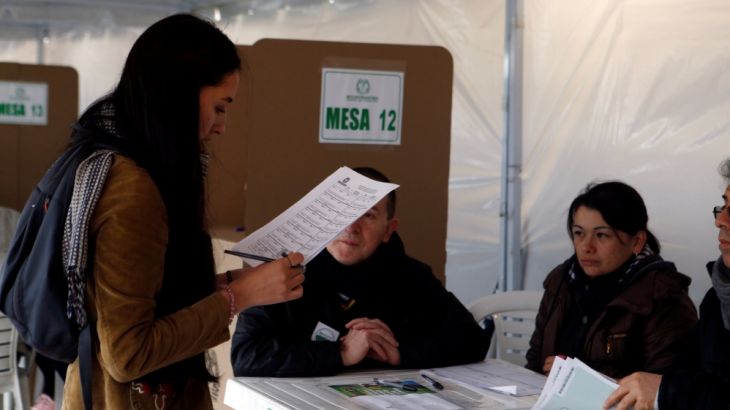Colombia anti-corruption referendum comes up shy on votes
The proposal included lowering politician’s salaries and increased transparency in public contracts.

Colombians have failed to approve rules that hardened punishment for corrupt officials, a measure sent to voters as a referendum after congress proved reluctant to implement stricter anti-graft measures.
About 11,700,000 Colombians headed to the polls to vote on the measure, which included seven proposals to target graft in politics and business.
Keep reading
list of 4 itemsA year since Pakistan’s May 9 riots: A timeline of political upheaval
Fiji’s former Prime Minister Frank Bainimarama jailed for a year
Candidates confront corruption and inequality in Panama’s presidential race
With almost all ballots counted, the measure was 470,000 votes short of the 12.1m needed for approval, election officials said.
“Ninety-nine percent of those of us who voted supported the initiatives,” said newly elected President Ivan Duque in an address to the nation.
“Unfortunately, the number of votes did not reach the minimum needed for approval,” he said.
The new measure included seven proposals, which would have seen harsher punishments for corrupt officials, increased accountability and the potential lowering of politician’s salaries.
Green Party Senator Angelica Lozano, who also supported the measure, said the vote had still had an impact.
“We were five cents short, but change is unstoppable and here there was a shaking of the traditional political class,” she told reporters.
The changes could have seen Congress members’ salaries lowered by 40 percent, politicians forced to declare their income and changes to term limits.
Enforcing mandatory jail sentences for corruption and changing the way public contracts are awarded in the country were also among the proposals.
Voters could return a different answer on each separate measure. Each question required a “yes” vote from at least 50 percent plus one of valid ballots to pass, and no less than a third of the 36 million registered voters must have voted.
Most parties in Congress voted in favour of holding the referendum before the presidential elections in June 2017, but have since avoided any promotion of the initiative.
“We’ve been waiting 25 years for Congress to act on these measures,” said Claudia Lopez, a former senator and a leading advocate of the initiative.
“Instead, they voted them down every single time.”
Activists collected four million signatures to get officials to fund Sunday’s referendum.
‘Symbolic effect’
Corruption costs the country $17bn a year, equivalent to 5.3 percent of GDP, the country’s comptroller has said. Colombia ranks 96 out of 180 countries, according to Transparency International’s corruption index.
Colombian law currently sets senators’ salaries at about $124,000 a year, more than what parliamentarians make in countries like the Netherlands, Sweden and France.
Many members of Congress have been accused of diverting public funds to local governments, led by mayors from their own political camps.
Al Jazeera’s Alessandro Rampietti, reporting from the capital, Bogota, said that the vote attracted an “unprecedented” number of voters for a citizen-driven initiative.
“It might be seen as a disappointment for the organisers and the more than tens of thousands of volunteers that have worked for the best of the last two years to bring this initiative to the ballot, yet even if it didn’t pass, it is a symbolic victory since never before have so many Colombians come out to vote in an initiative that wasn’t truly supported by the traditional political parties in the country.
“It says that a great number of Colombians want to see change in the way politics are done in the country and will put pressure on politicians to bring about concrete change and results against corruption,” he said.
|
|
Prior to the ballot, Duque announced he would vote, but many in his party said they would not.
“Laws don’t solve corruption,” said Samuel Hoyos, a member of the Democratic Center party.
“Colombia is full of codes, prohibitions and regulations, but nothing changes.
“We need to change the culture in the country and we need citizens to keep a close eye on politicians,” Hoyos added. “Otherwise, we are just throwing away public money in initiatives that will have little effect.”
![Duque casts his ballot in Bogota during the nationwide referendum [Ivan Valencia/AP]](/wp-content/uploads/2018/08/74ce0d315e494ff886633f494a3f60ec_18.jpeg)
Andres Hernandez, senior programme coordinator at Transparency International, believes the vote could have a major impact.
“If millions of citizens vote in favour of it, it will have a strong symbolic effect on the political class,” he told Al Jazeera before the vote.
“It will say this is not an issue that will fade into the background, that Colombians are expecting results and concrete measures.”